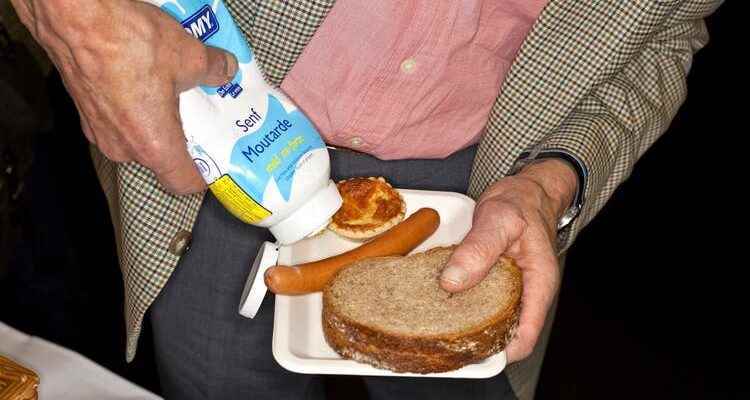Anyone who thinks a little – but not too much – of themselves is down-to-earth these days. Dogs, hotels, companies and politicians anyway. From a word that has become a Swiss ideal.
Jacket and Wienerli: In Switzerland people like to be simple and uncomplicated. Down to earth.
The wrestling king, Joel Wicki, felt relief when he was finally able to put his opponent on his back in Pratteln. He says “relief,” not pride. And then, into the outstretched microphones: “What’s most important to me is that I can get home accident-free and be able to work on the farm again tomorrow or the day after.” The finale was only a few moments ago.
Anyone who wanted to meet Polo Hofer, inventor of dialect rock, could buy a concert ticket. Or you could go to Bern. There, perhaps the best-known Swiss musician was in the tram on the way to the dentist or – a little more relaxed – outside in the sun at the Café des Pyrénées. Now that polo is no longer national, you can meet the rapper Steff la Cheffe here and there on the streets of Bern, often in jeans and sneakers and often unrecognized by most. Or at least left it alone.
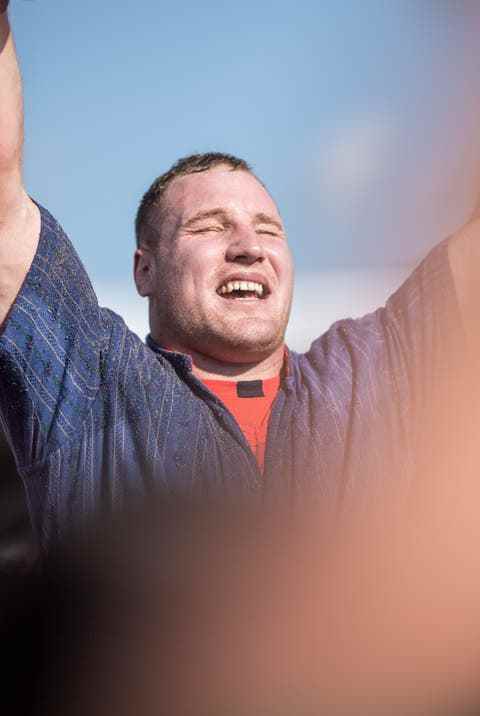
The wrestling king Joel Wicki.
That’s how it is with the successful ones in Switzerland – at least with the popular ones: They remain “one vo üs”. That’s what it says on the poster of a carving workshop in Entlebuch, in the kingdom of King Wicki.
If not here, where else do you know what this country is all about? Here, where the cows have horns and the farms have names. Where the congratulatory banners for the new Schwinger king are only slightly more numerous than the colorful signs announcing the birth of the next generation with names and dates. This generation, to which the most important characteristics are to be passed on.
An adjective makes a career
You can be goal-oriented in Switzerland, a little ambitious too and hard-working anyway. If you’re successful, that’s good. After all, we Swiss are a people of doers. Success shouldn’t just get into your head. Vanity is frowned upon. If you say you’re off the hook, then federal acceptance is gone. Better to keep both feet firmly on Swiss soil. You should be thankful instead of proud. Humble instead of demanding. Uncomplicated instead of demanding. Reasonable rather than overly idealistic. Open instead of distant. Or simply: down-to-earth.
The adjective has made a career in Switzerland like no other. The outgoing mayor of Oberägeri is down-to-earth, the Bernese Mountain Dog breed is “original and down-to-earth”, the concrete mixers of the Müller-Steinag Group are “independent and down-to-earth”, and in the “Waldhaus am See” hotel in Graubünden “down-to-earth tradition meets authentic Alps -Chic».
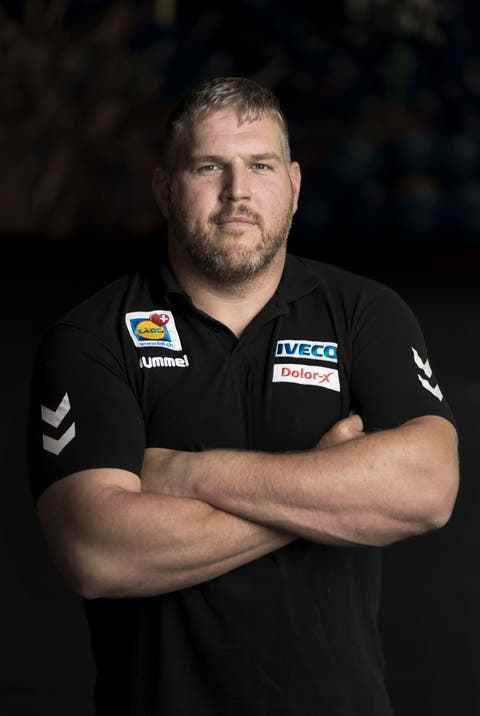
Bernese top wrestler Christian Stucki.
Call the wrestling king 2019, Christian Stucki. How to stay down to earth. Chrigu doesn’t think twice: “You should never forget that everyone stinks when they go to the Hüsli.” Down-to-earth – on the one hand, the word is big enough to encompass everything and everyone from the luxury hotel to the rebellious dialect rocker to the king of wrestling and the toilet saying. On the other hand, so manageable that no one hesitates to use it.
“Down to earth” and yet more
The fact that down-to-earthness can hardly be translated abroad makes it all the more fascinating for Switzerland. «Terre-à-terre» is French, not very poetic, close to everyday life – who wants to be that? “Down to earth” is what they say in English, and they don’t mean everything that our “down-to-earth” includes. That means modest and uncomplicated. In Spanish, people often just say «práctico» – practical.
We mean all that and much more besides. Because “down-to-earth” in this country goes far beyond the language. So much so that it scratches the border between “concept of life” and “political program” and for many it is equated with “ideal”, for some also with “home” and “tradition”. Exactly where we locate down-to-earthness also has to do with the characters that we associate with it.
Adolf Ogi brought down-to-earthness into the world
“Down-to-earthness is what you get from your parents. It has to do with family, with humility and gratitude. You learn that as a child, or you never learn it,” says one who has carried the down-to-earth attitude out into the wide world with public appeal: former Federal Councilor Adolf Ogi. He gave world politicians mountain crystals, lucky charms from the region, and brought them to Kandersteg. Because the mountains, above all, would make you humble. Humility, the tinder for down-to-earthness. Ogi used it often and gladly.
When the Federal Council could not agree – it was about finances – Ogi decided to pack up food and drink and ship the entire Swiss state government to the Schilthorn. “Nature had an effect on us there,” he recalls. “The mountains were there long before we came. And they’ll be there long after we’re gone. That inspires awe. And also a certain relaxation.” Relaxation because you can just give it up, because you don’t have to take responsibility for everything – some things are just bigger than all of us. The Blüemlisalp for example, the Schilthorn too and all the surrounding mountains. And yes, of course: A solution was found back then, on the mountain.
This anecdote says something about his own down-to-earth nature, Ogi thinks. Otherwise he couldn’t contribute much, he wasn’t an expert, but “efach geschnitzt”. But wait a minute, it actually has something to do with it. With simplicity and with values such as humanity and straightforwardness. With the realization that you are smaller than some things: “Because you come from a realistic world, not from a fantasy world.”

Connecting mountains: After the “Sissi” drilling machine had penetrated the last part of the Gotthard Base Tunnel in October 2010, Moritz Leuenberger, then head of the UVEK, hugged his former colleague Adolf Ogi.
Ogi’s former Federal Council colleague Moritz Leuenberger also sees realism as an important part of down-to-earthness. If you want to achieve a specific goal, you have to keep an eye on the horizon and still be realistic. Knowing that it takes a lot of individual steps and a lot of time, that you can reach your limits and therefore have to take detours. There it is, the down-to-earth attitude that has a lot to do with reality and without which you can hardly make any headway.
«The mountain is big, we are small»
Leuenberger, who during his tenure in Berne was often seen walking around the Parliament building without personal protection – another kind of Swiss thing that one cannot translate abroad – has nevertheless not inscribed himself in Switzerland’s memory as a down-to-earth man. “No, I don’t want to limit myself to down-to-earthness,” Leuenberger nods. He is a real politician, and “being down to earth also has a lot to do with a sense of proportion and with the human dimension as a benchmark. That’s a very positive thing. But the utopian in me would never be satisfied with that alone.”
In addition, down-to-earthness, this actually so sedate term, is often misused for other things. “It is associated with home and origins and thus also taken against everything that is foreign. Everyone sees horns and hornuss boards in front of them.» It’s no wonder that Juso wouldn’t dream of describing himself as down-to-earth. However, the word could also be recast. “Actually,” says Leuenberger, “this word needs to be reassigned.” Break. “Yes. I also claim ‘down-to-earth’ for myself.”
A word must be elastic when Adolf Ogi (SVP) and Moritz Leuenberger (SP) claim it for themselves. And it can unite; the two still refer to each other as friends. When Leuenberger stood in front of the EU transport ministers at the opening of the Gotthard base tunnel, he might have been thinking of the Schilthorn, but he was certainly thinking of down-to-earthness and modesty when he said: “The mountain is big, we are small.” He remembers it well to this day.
About the self-dwarfing of Switzerland
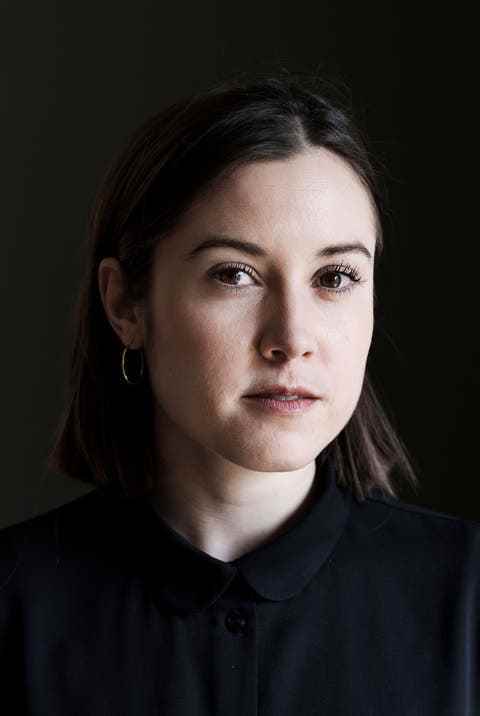
Laura Zimmermann, former co-president of Operation Libero.
“I think everyone thinks it’s good to be down-to-earth, but I’m not sure if we all understand it the same way,” says Laura Zimmermann, former head of Operation Libero. «For me it means recognizing your own strengths, but maybe not showing them off to everyone. Having self-confidence and basic trust in what you can do – and what you cannot do.”
Sometimes the down-to-earth attitude, the image of big mountains and small people, is also used as an excuse. “Then it’s self-dwarfing, under the cloak of down-to-earthness,” agrees Zimmermann, “don’t make yourself too big. It also takes away a certain amount of responsibility.”
«Gring ache u secklä»
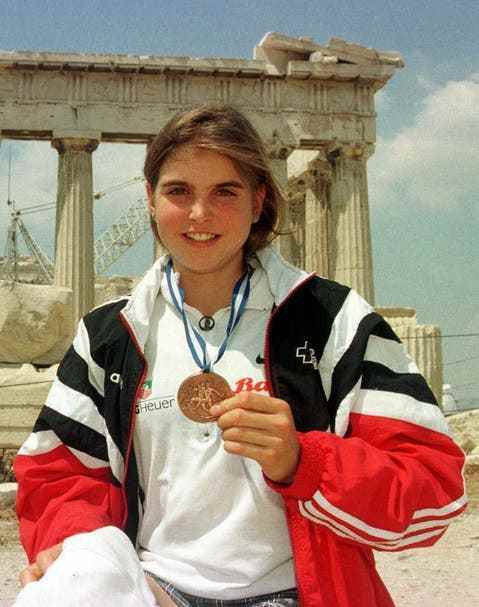
Anita Weyermann in August 1997 with her World Championship bronze medal on the Acropolis in Athens.
Track and field athlete Anita Weyermann was asked 25 years ago at the World Championships in Athens what goes through your head on the home stretch. With the first real “Schnuuf” the then 19-year-old replied: “Gring ache u secklä” – the Swiss dialect was richer by a figure of speech, Weyermann soon after by a bronze medal.
A quarter of a century later, Weyermann still lives in Bern, still likes to do sports, and the friends are the same as before the successes. There is pride, she says, “but in Switzerland, people tend to keep it to themselves. That’s true for me too.”
Is she down to earth? She doesn’t know. “I just prefer the kayak to the yacht. I have more fun there.” Weyermann thinks about it, then she says, yes, she has an example of Swiss down-to-earthness. When she spoke to the other athletes before a competition, the Americans, for example, always said they were doing “very well, very well”. And the Swiss? “We then said: Du mou, äs geit.”
